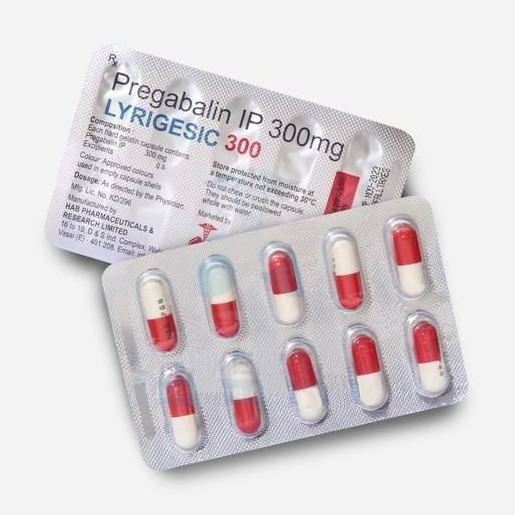Depression is a debilitating mental illness that can cause a person to feel hopeless and sad for long periods. While there are many treatments available for depression, such as therapy and medication, some people find that pregabalin works well for them. In this blog post, we will discuss what pregabalin is, how it works, and the benefits and side effects of taking it for depression.
Contents
Understanding Pregabalin And Depression
 Pregabalin, also known as Lyrica, is a medication commonly used to treat depression. This drug works by changing the way that certain chemicals in your brain interact with one another, helping to regulate mood and relieve symptoms of depression.
Pregabalin, also known as Lyrica, is a medication commonly used to treat depression. This drug works by changing the way that certain chemicals in your brain interact with one another, helping to regulate mood and relieve symptoms of depression.
Depression is a serious mental health condition that affects millions of people worldwide. It can cause feelings of sadness, hopelessness, and despair, as well as physical symptoms such as fatigue, changes in appetite, and sleep disturbances.
Is Pregabalin Good For Depression And Anxiety?
Pregabalin is a medication that is effective in treating the symptoms of depression and anxiety. Many people have found that taking pregabalin for their mental health issues can help them feel more stable, calm, and focused. However, it is important to consult with your doctor before starting any new treatment for depression or anxiety, as pregabalin may not be the best option for everyone. Some people may experience unwanted side effects from taking this medication, and it can also interact with other medications that you are currently taking.
So if you are considering using pregabalin to treat your depression or anxiety symptoms, it is important to do your research and talk to your doctor about the possible risks and benefits.
How Does Pregabalin Work On Depression?
 One of the main reasons why pregabalin is so effective in treating depression is because it works by targeting and modulating certain neurotransmitters in the brain. These chemicals, such as dopamine and serotonin, are known to play a key role in regulating mood and emotion.
One of the main reasons why pregabalin is so effective in treating depression is because it works by targeting and modulating certain neurotransmitters in the brain. These chemicals, such as dopamine and serotonin, are known to play a key role in regulating mood and emotion.
By increasing their activity levels, pregabalin can help to lift the symptoms of depression and improve overall mood.
Additionally, pregabalin has also been shown to have anti-anxiety effects, which further contributes to its ability to alleviate depressive symptoms. Overall, it is clear that pregabalin is an effective treatment for depression because it targets the underlying biological causes of this condition.
Pregabalin is a commonly prescribed medication for the treatment of depression. It works by modulating neurotransmitters in the brain to help reduce symptoms such as low mood, irritability, and anxiety.
If you are experiencing any of these side effects while taking pregabalin for depression, it is important to speak with your doctor right away. They can help you adjust your dosage or prescribe.
Is Pregabalin Safe for Depression?
Although pregabalin has been proven to be effective in treating depression. Is it safe to use for depression? Unfortunately, there is no clear answer to this question. Some studies have shown that pregabalin may help ease depressive symptoms by reducing excitatory neurotransmitters in the brain. However, other research suggests that pregabalin may actually worsen depressive symptoms over time. There are also some concerns about the long-term effects of pregabalin on the brain, as it has been linked to cognitive impairment and memory loss.
Given all this conflicting evidence, it is difficult to determine whether or not pregabalin is safe for depression treatment. Ultimately, the best course of action is to consult with your doctor about your individual situation and discuss-term the safety and effectiveness of pregabalin when it comes to treating depression. Overall, the jury is still out on whether or not pregabalin is truly safe for treating depression.
Benefits Of Taking Pregabalin
There are many benefits of taking pregabalin for depression. Some of these are:
Improves Mood
One of the benefits of pregabalin is that it can improve your mood. If you are suffering from depression, pregabalin can help to elevate your mood and make you feel better. Mood depends on many factors, including levels of certain chemicals in the brain. Pregabalin works by affecting these chemicals and improving mood.
Reduces Anxiety
Another benefit of pregabalin is that it can reduce anxiety. Anxiety is a common symptom of depression, and pregabalin can help to reduce anxiety levels. This can make it easier to cope with depression and make progress in recovery. Sometimes there are other benefits too, such as improved sleep and concentration.
Improves Sleep
Also, pregabalin can improve sleep. Depression can cause problems with sleep, such as difficulty falling asleep or staying asleep. Pregabalin can help to improve sleep by reducing the time it takes to fall asleep and increasing the amount of time you spend in deep sleep.
Reduces Pain
Pregabalin is also effective in reducing pain. This is because depression often causes physical pain, such as headaches and muscle aches. Pregabalin can help to reduce this pain and make it easier to cope with depression.
Makes It Easier To Cope With Depression
Pregabalin can also make it easier to cope with depression. This is because it can help to improve mood, reduce anxiety, and improve sleep. All of these things can make it easier to deal with depression and make progress in recovery.
Thus these are some benefits of taking pregabalin for depression. If you are suffering from this condition, it may be worth considering trying pregabalin to help improve your symptoms and make it easier to cope with the condition.
Talk to your doctor about whether pregabalin is right for you, and work together on a treatment plan that suits your needs. With the right treatment, you can recover from depression and start living your life to the fullest once again.Overall, pregabalin is a very effective treatment for depression that can help to improve mood, reduce anxiety and pain levels, and make it easier to cope with this condition.
Common Side Effects Of Pregabalin
The common side effects of pregabalin include dizziness, drowsiness, and nausea. These side effects are usually mild and will subside as your body adjusts to the medication.
They are more likely to occur at the start of treatment, so it is important to be aware of them and take precautions to minimize your risk. For example, you may want to avoid driving or operating heavy machinery until you know how pregabalin affects you.
Drowsiness and fatigue
Pregabalin can cause drowsiness and fatigue, which may make it difficult to concentrate or stay alert. If you experience these side effects, be sure to take your medication at a time when they are less likely to interfere with your daily activities.
Headaches
Many people taking pregabalin experience headaches as a side effect. If you find that your headaches are severe or interfering with your daily activities, talk to your doctor about potential alternative treatments.
Dizziness and balance issues
some people have reported experiencing dizziness and balance issues while taking pregabalin. If you notice that your balance has become unsteady or that you are experiencing more frequent falls, speak to your doctor about whether it might be appropriate to reduce your dose or stop taking the medication altogether.
Nausea and vomiting
many people experience nausea and vomiting as a side effect of pregabalin. If this is the case for you, it is important to talk to your doctor about ways in which you can reduce these symptoms and manage the discomfort that they cause.
Constipation
Pregabalin can sometimes cause constipation, which may result in a buildup of waste material in the body. To avoid this problem, be sure to drink plenty of water and eat high-fiber foods to keep your digestion functioning properly.
Insomnia
Some people also experience insomnia as a side effect of pregabalin. If you are having trouble sleeping, try engaging in relaxation techniques before bed or talk to your doctor about whether there might be an alternative medication that is better suited to managing your symptoms.
Other potential side effects include weight gain, dry mouth, blurred vision, and constipation, including as follows:- Overall, pregabalin can be a very effective medication for managing the symptoms of depression.
However, it is important to be aware of any side effects that may occur and take steps to minimize their impact on your quality of life. If you are experiencing severe or persistent side effects while taking pregabalin, consult with your doctor right away to discuss your options and come up with a plan that works best for you.
What To Avoid While Taking Pregabalin For Depression
Pregabalin is a commonly prescribed medication for the treatment of depression. However, there are certain things that you should avoid while taking pregabalin for depression.
Avoid Taking Alcohol
First and foremost, you should avoid drinking alcohol while taking pregabalin. This is because alcohol can interact with the medication and cause serious side effects, such as dizziness or drowsiness.
Avoid Driving
You should also avoid driving or operating heavy machinery while on pregabalin, as it can affect your ability to concentrate and react quickly. If you find that your depression symptoms are interfering with your ability to drive or perform other important tasks, talk to your doctor about adjusting your treatment plan.
Pregnancy
If you are pregnant or planning to become pregnant, it is important to talk to your doctor before taking pregabalin. Pregabalin can cause serious birth defects and should only be used during pregnancy if the potential benefits outweigh the risks.
Other medications: In addition to depression, pregabalin is also commonly prescribed for a range of other conditions, such as anxiety, nerve pain, and seizures. Before taking pregabalin for depression, make sure to inform your doctor about any other medications you may be taking. This is important because some drugs can interact with pregabalin and cause dangerous side effects or decrease its effectiveness.
Conclusion
It may be concluded that pregabalin is an effective treatment option for patients suffering from depression. This medication has been shown to help improve mood and reduce depressive symptoms, making it a viable choice for many individuals struggling with this debilitating condition. Furthermore, pregabalin is known to be well-tolerated by most people, with few serious side effects reported.
Talk to your doctor today about whether it could help improve your symptoms and improve your quality of life.
For further information and suggestions, please contact Therapy Mantra. We have a team of expert therapists and psychiatrists that can help you overcome this problem. Get in touch with us right away to learn more about our services. You may also make an online therapy session or download our free Android or iOS app.


